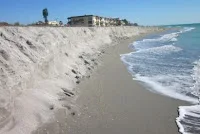Sea level rise in the past two decades has accelerated faster than previously thought in a sign of climate change threatening coasts from Florida to Bangladesh, a study said today.
The report, reassessing records from more than 600 tidal gauges, found that readings from 1901-90 had over-estimated the rise in sea levels. Based on revised figures for those years, the acceleration since then was greater than so far assumed.
The report said the earlier readings were incomplete or skewed by local factors such as subsidence.
The new analysis "suggests that the acceleration in the past two decades is 25 percent higher than previously thought," Carling Hay, a Canadian scientist at Harvard University and lead author of the study in the journal Nature, told Reuters.
The study said sea level rise, caused by factors including a thaw of glaciers, averaged about 1.2 millimetres (0.05 inch) a year from 1901-90 - less than past estimates - and leapt to 3 mm a year in the past two decades, apparently linked to a quickening thaw of ice.
Last year, the UN's Intergovernmental Panel on Climate Change (IPCC) estimated the 1901-90 rate at 1.5 mm a year, meaning less of a leap to the recent rate around 3 mm.
The report, reassessing records from more than 600 tidal gauges, found that readings from 1901-90 had over-estimated the rise in sea levels. Based on revised figures for those years, the acceleration since then was greater than so far assumed.
The report said the earlier readings were incomplete or skewed by local factors such as subsidence.
The new analysis "suggests that the acceleration in the past two decades is 25 percent higher than previously thought," Carling Hay, a Canadian scientist at Harvard University and lead author of the study in the journal Nature, told Reuters.
The study said sea level rise, caused by factors including a thaw of glaciers, averaged about 1.2 millimetres (0.05 inch) a year from 1901-90 - less than past estimates - and leapt to 3 mm a year in the past two decades, apparently linked to a quickening thaw of ice.
Last year, the UN's Intergovernmental Panel on Climate Change (IPCC) estimated the 1901-90 rate at 1.5 mm a year, meaning less of a leap to the recent rate around 3 mm.
The Harvard-led study said the new findings might affect projections of the future pace of sea level rise, especially those based on historical trends.
John Church, a top IPCC author at the Commonwealth Scientific and Industrial Research Organisation in Australia, told Reuters he did not expect any impact on the IPCC's core sea level projections, which are not based on past trends.
IPCC scenarios, which range from a sea level rise of 28 to 98 cms this century, are based on the processes driving sea level change, for instance how ice in Greenland reacts to rising temperatures or the expansion of water as it warms, he said.
Stefan Rahmstorf, of the Potsdam Institute for Climate Impact Research and a world expert in past sea levels, said further analysis was needed to pin down 20th century sea level rise.
The new findings confirm that "sea level is rising and ... the rise has accelerated, with the most recent rates being the highest on record," he told Reuters.
Sea level rise is gnawing away at shores from Miami to Shanghai. In cities such as Jakarta, the rise is aggravated by big local subsidence. [buenosairesherald.com]
14/1/15
--
-
Related:
Scientists: Rising Sea Levels Threaten NASA Space Centers
Scientists Discover World’s Oceans Warming Faster Than Predicted
"Raise your voice, not the sea level," urges UN on World Environment Day
Ice Loss from Antarctic Glacier Unstoppable









 GR
GR FR
FR DE
DE ES
ES IT
IT RU
RU EU
EU